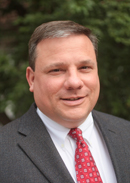
Campaign finance reform in American politics seems like a good idea. Reform would reduce corruption and restore the public’s faith in government.
But Jeffrey Milyo, who gave the Corps of Discovery Lecture Sept. 9 in Reynolds Alumni Center, sees it differently. Sure, money is important in politics. But money doesn’t drive public policy content and election outcomes to the degree that the general public thinks.
“We’ve got this romantic notion that if somehow we could get money out of politics, it would all be rainbows and puppies,” said Milyo, a University of Missouri professor of economics. “But let’s put that aside and let the data” frame the discussion.
What followed during his hour lecture, called “Dirty Secrets: The Real Truth About Money in American Politics,” were anecdotes buttressed by a dizzying display of charts and graphs on election outcomes, campaign finance, and state and federal regulations.
Are elections and public policy for sale? Not so much, according to Milyo’s data. “You get these repeated results from natural experiments that suggest that campaign contributions and lobbying aren’t as influential as most people take as a given,” he said.
Now in its 11th year, the Corps of Discovery Lecture is an annual talk by an MU faculty member considered an expert in his or her field. Last year, Professor Jerry Taylor discussed the impact of humans on the bovine genome. And in 2012, Professor Frank Bowman III spoke about the Boone County criminal justice system during the Civil War.
Milyo began his MU career in 2004. Prior to that, he taught at Tufts University and the Harris School of Public Policy at the University of Chicago. During his 20 years in academia, Milyo many times has provided expert testimony to the U.S. Congress and served as a witness in state and federal election disputes.